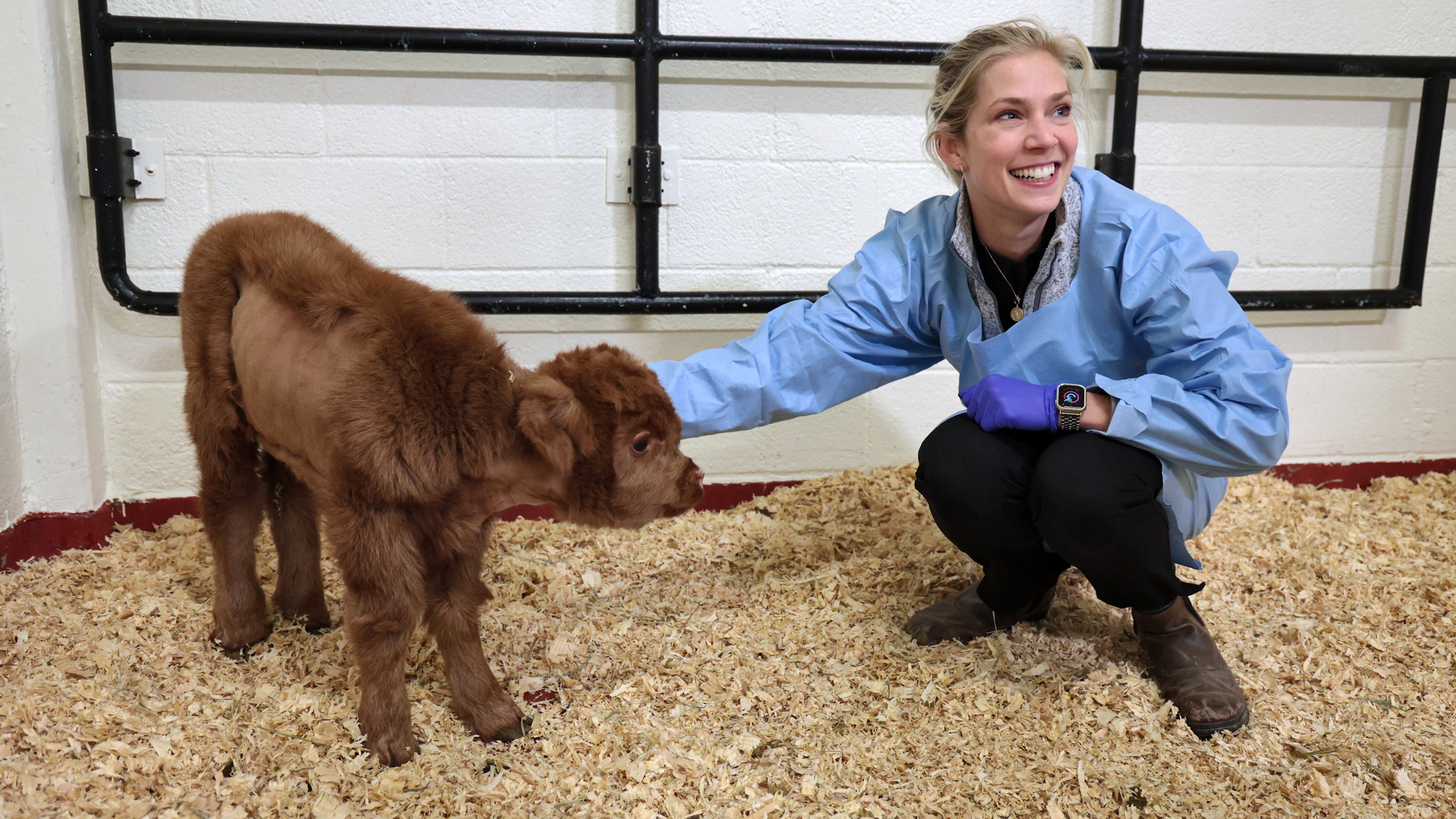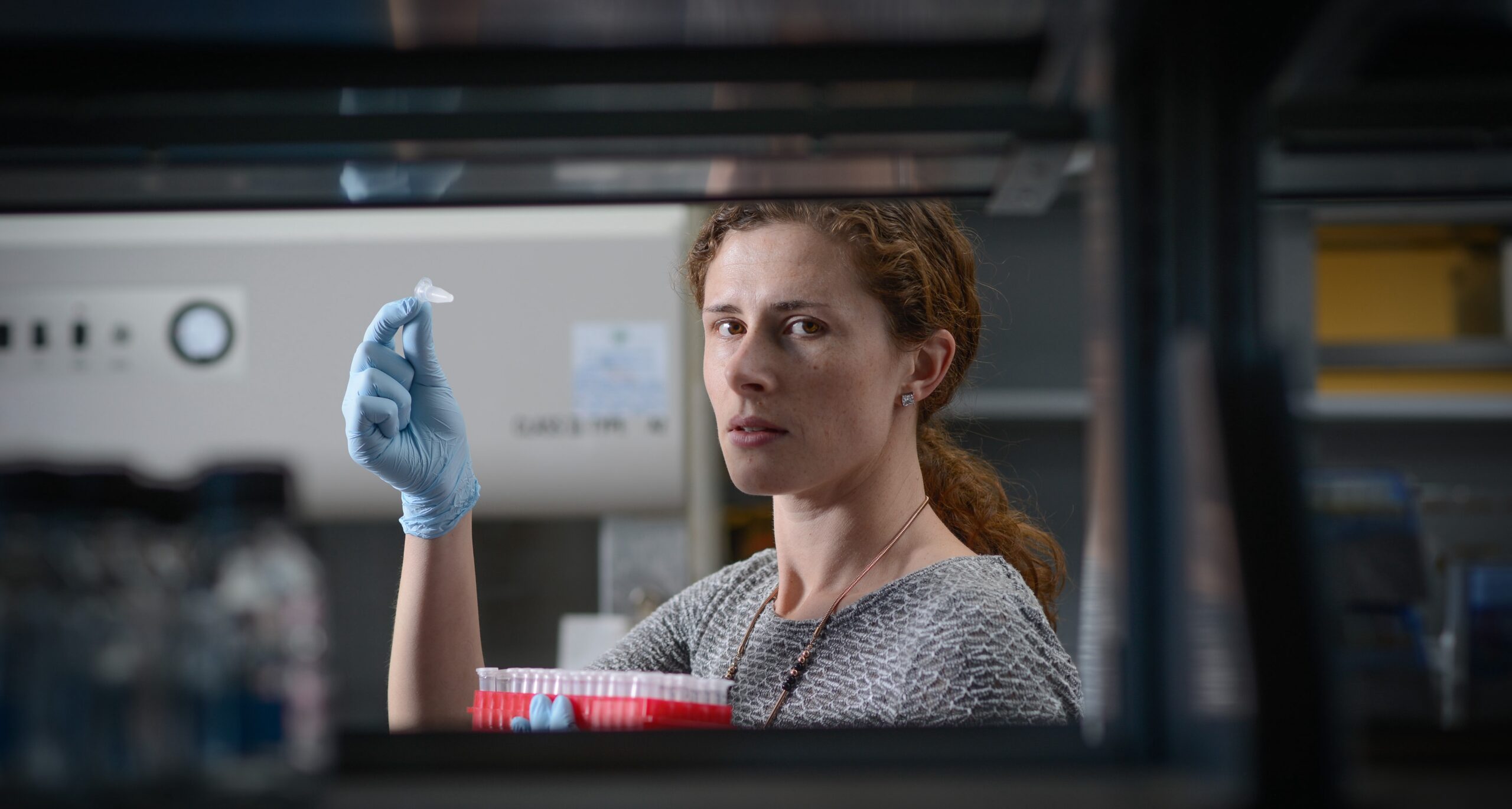Committed to Improving Horse Health

Ask Johanna Elfenbein why she came to NC State — ask her about anything related to equine medicine, really — and she’ll answer matter-of-factly but with flashes of underlying passion.
“This is the place that fosters the clinician-scientist best of all the places across the country,” said Elfenbein. “I knew I wanted to be a scientist. I was already an equine internist and I wanted to do both. And this was the place where I wanted to do both.”
She got what she wants. Arriving at the College of Veterinary Medicine in 2014, Elfenbein splits her time between clinics as an equine internal medicine specialist and, as an assistant professor of equine medicine, working in a lab with students. Her research, studying the ins and outs of Salmonella and equine colic, informs how she treats horses. And the horses she treats drives her to uncover the unique behavior of infectious diseases to develop the most effective treatments for animals — and potentially humans.
A Florida native, Elfenbein received her undergraduate degree in biochemical sciences from Harvard University in 2003, going on to earn her DVM from the University of Florida in 2007. Following an internship at the University of Georgia and a return to the University of Florida for her residency, she completed her Ph.D. in biomedical sciences — focus: Salmonella pathogenesis — from Texas A&M University shortly before joining the CVM faculty.
Elfenbein recently received a research training grant from the American College of Veterinary Internal Medicine that creates a fellowship in host-pathogen interactions for a first-year Ph.D. student at the CVM. Elfenbein will co-direct the program, which includes several research projects vital in developing new vaccines to fight an array of diseases.
Elfenbein, who lives in Moncure with her two dogs, a hound mix and a lab mix, talked to us about bonding with horses, the future of equine medicine at the CVM and more.
What drove your interest in this particular field of equine medicine and research?
So the question that always got to me during my residency was, why did my horse get sick from Salmonella when the horse in the stall next door didn’t get sick? And the answer has always been I don’t know and remains, I don’t know. I studied Salmonella because I really wanted to know why some horses got sick and others were infected but perfectly healthy on the outside. And we still don’t know. But at least I know why we don’t know.
You like the challenge of your work.
I do. It’s actually really fun.
What’s the most fun for you?
Oh, that’s a tough question to answer actually. I am excited about the biology. The actual science is very interesting and very fun. You’re only limited by your own creativity.
The other thing that I really enjoy is teaching students in the lab. I have had the opportunity with one grad student and to watch her become excited about the project and develop her own questions and come up with her own ways of answering has been just incredibly fun.
What have your students told you about their interest in the type of work you do?
The vet students who tend to work with me do so because they want to do something different. They want to have experiences that maybe they haven’t had before. After they have the experience, they take one of two routes. They either decide that they are pretty happy sticking with the clinical side or they say they have a burning desire to know the answer to the experimental research question and they must do more of this.
You have to have that burning desire to continue with research.
When only one out of five experiments works or your paper gets rejected six times before it actually gets accepted, in order to be able to wake up and be excited about doing the work the research question has to burn a hole in your soul essentially.
How did you become first interested in horses?
My mom made me ride when I was 8. She literally forced me the first time and then that was it.
It was an instant love?
Horses are interesting. They don’t have to do what you say, but they actually do. I think it’s pretty amazing that you can form this bond with this animal that is literally 10 times bigger than you are. I think that bond with the animal was relatively instant and followed me and led me to where I am now.
Because you have that experience bonding with a horse, I’m assuming that helps with your work but could also make it difficult at times.
It is really, really hard actually. I think it’s critical to separate yourself from the animal and often the most difficult cases are when I become attached to the owner and the horse at the same time. And it’s usually because of a story, a personal thing that probably relates to something I’ve been through.
There’s this balance between being compassionate and working very hard to not allow the compassion to override the ability to critically think about the condition of the patients.
What research are you focused on right now?
The primary thing I do in my lab is studying Salmonella itself. I’m a bacterial geneticist by training. We are interested in how Salmonella grows inside the intestine. The project that wakes me up in the morning is understanding that.
Put into perspective the importance of studying Salmonella and colic in horses.
Salmonella is the leading cause of bacterial foodborne gastroenteritis in people. So you’re looking at more than 1 million cases in people per year in the U.S. and somewhere around 150 million cases worldwide. For the veterinary side, cattle and pigs can be infected and diseased by Salmonella. Chickens are infected and shed the organism. So if you eat improperly cooked meat, that’s one way you can become infected with Salmonella.
Colic is a leading cause of morbidity and mortality in horses. Horses with colic are more predisposed to have Salmonella. We don’t know if it’s the cause of the colic or if it is because they have a GI disturbance then they are likely to become infected. Salmonella can either be present in a completely normal horse or it can cause diarrhea and death. And that’s what we see in people, too.
I don’t know if you think this way, but is there a long-term goal in mind? What’s the dream result of your work?
We will make a new vaccine or a new antibiotic that will transform disease prevention or treatment.
You sound very confident about that.
Yes, we will do that.
What is it going to take to make that happen?
That’s a great question. I think we have to think about disease in way that hasn’t been thought about before. So I believe it will come out of a novel vaccination or therapy strategy. The thought process has to be different.
How do you measure success right now?
I mean, I can say that everybody measures success in grants or papers, so those things are nice. I think the personal side is a little more fulfilling. For me, the students really make me feel like I’ve made a difference. It may not be a difference on a global scale because it’s not really tangible, but when I can see a student start to be able to think through a problem and describe their thought process, I feel like I actually taught somebody something.
Which advancements in equine medicine do you feel are particularly promising?
I think equine medicine will be transformed by new imaging. There are companies that are making new robotic CT scans for horses, so we will potentially have the ability in the not-very-distant future to vastly improve our imaging capabilities which from an internal medicine standpoint will be revolutionary. We will be able to diagnose disease earlier and better.
What would you say makes a good vet a great vet in your field?
I think the ability to communicate with the client so that you can really understand their concern. You educate them and work with them to diagnose and or treat the problem that is the most concerning to the client.
You make it sound easy, but that’s often very difficult.
People who do it well are amazing to watch. Those are the veterinarians who can truly understand what the client and the horse are dealing with. Those are the veterinarians who are able to make the biggest impact.
How would you describe your time here so far with the equine team?
It’s a really exciting time to be in equine. The new sports medicine service and rehab service that we’re working to get off the ground — it’s going to be really, really exciting. I think it’s going to allow us to collaborate more with other services in a more direct, distinct way.
What are the potential large benefits of the sports medicine service?
I think we can help the kind of horses we have in North Carolina. We have these elite performance horses and by having all the specialists in one area we can truly help to diagnose a reason why a horse that has the potential to be an elite athlete has some stepping stone that it’s not able to overcome to be that elite athlete.
I think we really have the ability to help those animals go to the next level. We can focus our collective energies on what does it take to make this animal an Olympian. He has the capacity to do it. Let’s get him there.
For more information on the NC State Veterinary Hospital’s equine service, go here.
~Jordan Bartel/NC State Veterinary Medicine


